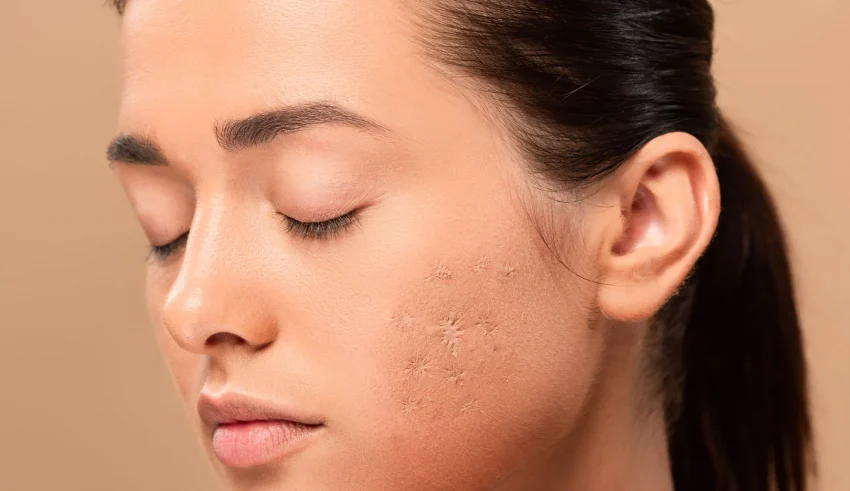
Even after you get rid of a stubborn pimple, you may still have an unpleasant reminder in the form of a scar. Acne scars may not be as irritating as the acne itself, but they can reduce your self-confidence and last for years. Thus, it’s important to find an acne scar treatment to get rid of these annoying pigmentations as quickly as possible. In this article from The Dermo Lab, we’ll discuss a number of ways to get rid of acne scars in collaboration with the dermatologist Dr. Maha Sultan.
What are acne scars?
Acne scars are a visible consequence of acne. According to Dr. Maha Sultan, acne scars are most often the result of an inflamed lesion such as a papule, pustule, cyst, or nodule. Inflamed spots are the result of enlarged pores caused by excess oil, dead skin cells, and bacterial build-up.
There are two main types of acne scars:
- Depressed or atrophic scars: These develop when there is tissue loss. The two most common types are ice-pick scars (small but visible holes in the skin) and wagon scars (depressed areas that are often round or oval with steeply sloping sides, much like chicken pox marks).
- Hypertrophic or keloid scars: These are caused by an excess of raised tissue on the surface of the skin, as the body produces too much collagen during the healing of acne wounds.
Acne scar treatments are available to eliminate acne scars or improve the appearance of a complexion affected by acne scars.
What are the main causes of acne scars?
Acne scars are often the result of inflamed blemishes that occur when the skin’s pores become clogged with excess oil, dead skin cells, and bacteria.
Common causes of acne scars include:
- Inflamed acne
- Neglected inflamed acne
- Prickly acne
- Family history of acne
We asked Dr. Maha Sultan if PCOS (polycystic ovary syndrome) causes acne scars. She explains that PCOS creates high levels of testosterone in the body, which leads to excessive sebum production and results in acne and acne scars.
At some point in life, most people experience acne, especially during adolescence. Acne is largely triggered by hormonal changes. It can also appear later in life due to menstrual cycles, birth control pills, reactions to certain products, or even stress.
Keep reading to learn how to reduce acne scars!
What is the best acne scar treatment?
Just as there are several effective acne treatments, there are several ways to get rid of acne scars. Here, we will go over the best acne scar treatments. Dr. Maha Sultan lists 6 ways to treat acne scars: dermabrasion, laser treatment, micro-needling, scar subcision, fillers, and chemical peels.
- Dermabrasion
Dermabrasion is a procedure in which a coarse material is used to scrape away some of the skin down to the dermis. This procedure is used for several skin pigmentation problems, including scars. However, this acne scar treatment is primarily recommended for people with fair skin, as dermabrasion can cause discoloration in people with darker skin.
- Laser treatment
Laser treatment of acne scars works by targeting the affected area with a beam of light at a specific energy level. This focused energy stimulates the tissue, triggering its repair. Over time, after several procedures, the scar pigment will look more and more like the surrounding skin. At best, laser therapy can make acne scars disappear completely.
- Microneedling
This procedure involves the use of a wheeled device with several small needles that carefully penetrate the skin and the underlying scar tissue. In other words, the tiny needle punctures are designed to stimulate collagen production in the affected area of the skin, which helps lighten or fade the scar over time.
- Scar subcision
Subcision is a simple minor surgical procedure that is an ideal treatment for depressed scars. Subcision is a safe procedure that involves inserting a small needle under your skin to reduce the appearance of acne scars.
- Dermal fillers
Also known as soft tissue fillers, dermal fillers are injections of proteins (sometimes collagen) and/or acids designed to fill or plump a targeted area of skin. The filler is injected directly into the scar tissue and produces immediate but temporary effects. While dermal fillers for acne scars can be very effective, they do not last forever. Patients may need to repeat injections every year to prevent their acne scars from recurring.
- Chemical peels
Certain chemicals such as phenol, glycolic acid, and salicylic acid are also effective treatments for acne scars. A professional dermatologist will apply a peel containing one of these chemicals on the skin and let it work. These acidic substances remove the top layer of skin allowing the new layer of skin cells to grow and replace the old scarred cells.
The six treatments described above remain the most common and the most effective ways to get rid of your acne scars and reduce their appearance. Dr. Maha Sultan points out that acne scars need 3 to 6 months, sometimes more than 12 months to fade. She also stresses that it is best to avoid scarring by treating acne early and properly.
Many people ask how to remove acne scars naturally. In fact, there is no known natural way to completely remove scars. Therefore, it’s always better to opt for medical treatments.
How can I avoid making acne scars worse?
- Don’t scratch the scars, as bacteria can lead to further scarring.
- Don’t rub or over-wash scarred areas.
- Avoid heavy sun exposure, as it can make scars more visible.
- Quit smoking. Studies have shown that scars heal more slowly in smokers.
People whose skin is affected by acne scars can suffer emotionally, physically, and socially. Patients who have had permanent acne scar treatment benefit from an improved appearance that can boost their self-esteem and allow for better skin health.
Your health is at the heart of what we do. The experts at The Dermo Lab are always here to guide you in choosing the right treatment plan for your type of skin.
Last Updated on April 16, 2024









